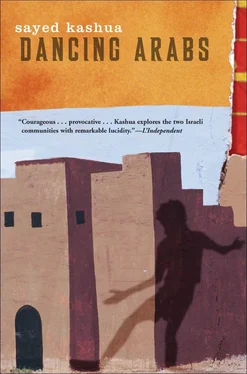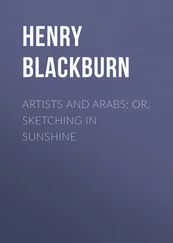The radio is playing “ Abu el-Halil ”; I can’t believe I’m hearing that song. How could the cassette have survived so long? It’s the song we used to listen to in Father’s car when we went into the mountains to pick hyssop. I used to know the words, and I discover I still do. I sing along with the tape, as if I’ve never stopped listening to it. “ Ya Amina, ya abu el-Halil … open the Nablus Gate for us and let us all enter.” Then came another song I used to love, about putting the shame behind us and restoring our honor with stones and with blood, about children who are fearless. I laugh, now, at the quality of the recording and the quality of the music.
I lower the volume and drive through Tira. It’s Friday, and late, but people are still roaming the streets. Lots of youngsters are in their cars or walking, and I wonder where all of them are heading, and on the night of Land Day, no less. There was supposed to be a general strike, but the stores opened even before noon. People can’t afford to lose the income. Besides, strikes scare the Jews who drive through on their way to Tsur Natan and Kokhav Yair. They’re good customers.
On the wall in my wife’s old room there’s a picture of Nelson Mandela, taken long ago, when he was behind bars. The Mandela of those days was young and strong, with a full black beard. Next to him is the drawing of a hammer and sickle, and the red Soviet flag. There are photos of models and beauty queens too, and Egyptian singers like Ihab Taufiq and Amer Diab, and women in bathing suits and dresses dating back to the eighties. The most up-to-date one in the room that my wife shared with her five sisters is of Brandon from Beverly Hills 90210. She hung it up there when she was in high school. All the sisters are married by now, and the room with the peeling walls is where we stay on our rare visits to Tira.
My mother-in-law has put the beds together in one of the corners, under the pictures of Ofra Haza and a celebrity model. Ever since the wedding, two years ago, we’ve had the same sheets waiting for us, the same thick pillows, solid as a rock, and the same scratchy woolen blanket that forces us to sleep fully dressed even on the hottest summer nights. It’s very hot in Tira. In the past, people would sleep up on the roof in summertime, but they’re too scared now. They don’t feel safe anymore. You’re not supposed to leave your front door unlocked. The village is infested with thieves and criminals and rapists, especially now that they brought in all kinds of collaborators — and their weapons too.
My wife’s old room does this to me every time: Suddenly I’m terribly attracted to her, as if we just met. She always puts on one of her mother’s faded robes, and I can’t resist. We always make love in her room and continue to hold on to each other in our sleep. In her room, my heart fills with love. She’s pretty as ever in my eyes, pretty as she used to be, when we first met. She says these are our best times together, the ones in Tira.
Very soon her parents are going to be renovating the house and tearing down this room. The house has always been in bad shape. Before the first time we went there, my wife cried. I was about to ask her parents for her hand, and she was ashamed to show me where she lived. She kept hoping neither one of us would have to use the bathroom, which is the most shocking part of the house. Her father had knocked ten steel nails into the wall over the sink, for hanging sponges, and wrote the name of each member of the family over one of them. Not sponges you buy but loofahs, the kind you make yourself. Seven of the nails have nothing on them anymore. The only pieces of loofah still hanging there belong to her parents and her youngest brother. He’s two years younger than us. He’s been plodding away at one of the colleges for the past few years, studying economics, and there’s a good chance he’ll graduate soon. He has his own room under the house. It used to be a storeroom for oil and olives, and it had an oven too. Then, when he grew older, they put a bed in there, and he moved in. He covered the bare walls with red scarves of the Hapo’el soccer team, and with pictures of the Chicago Bulls, Michael Jackson, Fairuz, and Lenin, and with Land Day posters, like the one of a man sitting under an olive tree holding his blond grandson, who’s covered in a kaffiyeh, and the inscription WE’RE STAYING PUT.
They’re remodeling the top floor for him now, and the parents will get their storeroom back. They don’t need more than that, my mother-in-law says, and it’s time for their only son to have a home of his own. That way he’ll be able to get engaged, be married, and have children.
My little brother has tied his fate to a different world. He’s moved out of the village, like me, but he doesn’t mix with the Jews. He doesn’t have any friends, either in the village or in Tel Aviv. My little brother doesn’t talk. He’s always been like that. He can spend entire days without saying a single word. His teachers in the village used to think he didn’t understand what was going on in class, because he never took part, never raised his hand in class to give an answer. Sometimes, after parent-teacher day, my father would yell at him, “What are you, a sissy? Why are you so shy?” My brother would hear him out and wouldn’t answer. His grades were always fine, so they left him alone.
My little brother doesn’t like people, especially strangers. When anyone knocked on the door, he’d head right for his room, even if he was the only one home. And if he happened to come home from school and heard strangers talking inside the house, he’d always wait outside under a tree till the guests left. Anything but meeting people face to face. He was capable of spending hours in the rain or in the heat just to avoid it.
My little brother never answers the phone. That’s just how it is. My parents have finally given up on him and stopped telling him off. When the phone rings, he’s off to his room. He stays in there with his music — his not-Jewish and not-Arab music.
For some reason, my parents think my little brother loves me. They think we’re both kind of strange and different, so sometimes when I’m at home they ask me to try to talk with him, see how he’s doing. “Ask him how his studies are going,” my mother says sometimes. “Ask him how things are going at the university, if he has any friends, if he needs money, if he manages okay with the food and with his roommates.” When you ask him something, he can just keep nodding, and it’s hard to tell what he’s really thinking. But he mails my parents the transcripts with his grades, so they don’t worry, they know he’s doing all right.
My little brother is an artist. He draws portraits and still lifes. He doesn’t show his paintings to anyone. Sometimes, when I’m at home, I go through his drawers and his notebooks and look at his silent drawings. He wanted to study art, but our parents said it wasn’t practical, and that a person needs to have a job first, a profession. Art is a hobby; there’s nothing you can do with it. My little brother didn’t argue. My parents checked out his grades, decided he was cut out for nursing, and sent him to nursing school.
After that, he hardly ever came home. In the daytime he studies and at night he works. On ‘id el-adha, he took a day off from work and came to the village to see my daughter. It had been nine months since she was born, and he hadn’t seen her yet. He smiled at her and tried to pick her up, but he didn’t know how. He tried to play with her but gave up because he knew it wouldn’t work. He didn’t want to play with her in front of everyone. That wasn’t his style. He stared at her, and eventually he took her to his room. I have no idea what they did in there. Must have stuck earphones on her head. Anyway, when he brought her back, she was all smiles.
Читать дальше












